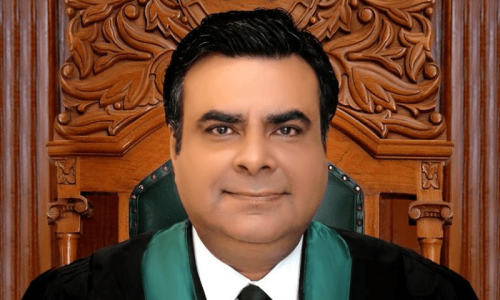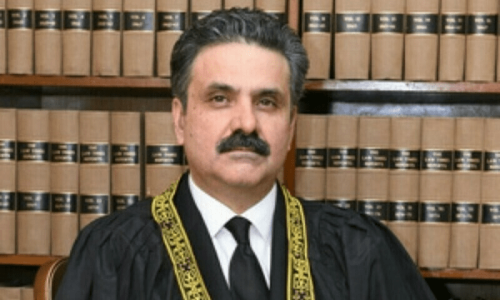PESHAWAR, Jan 28: The United Nations has selected former Peshawar High Court judge Shahjehan Khan Yousafzai as one of the international experts for inquiry into the legality and casualties of drone strikes in Pakistan and other countries.
Justice (r) Yousafzai had resigned as senior puisne judge in protest around a year ago after being superseded twice during the appointment of the high court’s chief justice.
Apart from Justice (r) Yousafzai, another member of the team from Pakistan is journalist Imtiaz Gul, who is also the executive director of the Islamabad-based Centre for Research and Security Studies. He has written four books on Al-Qaeda, Taliban and Pakistani militants.
Sources close to the ex-judge’s family have told Dawn that the relevant UN officials had sought Justice (r) Yousafzai’s CV several days ago expressing the desire to include him in the group of experts to be tasked with looking into the legality and civilian casualties of the US drone strikes in Pakistan, Yemen and Somalia, and those by the US and UK forces in Afghanistan and by Israel in the occupied territories.
They said the ex-judge had given his consent to be part of the said panel.
Last year, the UN Human Rights Council had asked its special rapporteurs to begin an investigation after a group of nations, including Russia, China and Pakistan, requested action on drone strikes.
Justice (r) Yousafzai was appointed additional judge of the high court on Feb 1, 1997, and after a year, he was confirmed as a judge of the high court.
Prior to his elevation, he was the member of PHC Bar Association and had also served as the additional advocate general. He had also served as acting chief justice on several occasions.
He had tendered his resignation in Nov 2011 and it was accepted by the president with effect from Jan 30, 2012.
Mr Yousafzai had resigned after then PHC Chief Justice Ijaz Afzal Khan was elevated to the Supreme Court and Chief Justice Dost Mohmand Khan was appointed his successor.
According to him, tenure wise, spread over a period of around 15 years, he was senior to all judges and chief justices of the three other provincial high courts, Islamabad High Court and Azad Jammu and Kashmir High Court, but despite that he was neither elevated to the Supreme Court nor was he appointed the chief justice.
In the letter of his resignation, he stated that the Judicial Commission and the Parliamentary Committee for appointment of judges had infringed upon his right of elevation by ignoring him as judge of the Supreme Court or the PHC chief justice.
“In doing so, they violated the right of equal and fair treatment enshrined in the Constitution,” he stated.
Also, he had stated that without assigning any reason, he was superseded and Justice Ejaz Afzal was appointed the PHC chief justice on Oct 20, 2009, by the president in consultation with Chief Justice Iftikhar Mohammad Chaudhry.
Later in Nov 2011, he added that he was again superseded when Justice Dost Mohammad Khan was appointed the chief justice.















































Dear visitor, the comments section is undergoing an overhaul and will return soon.